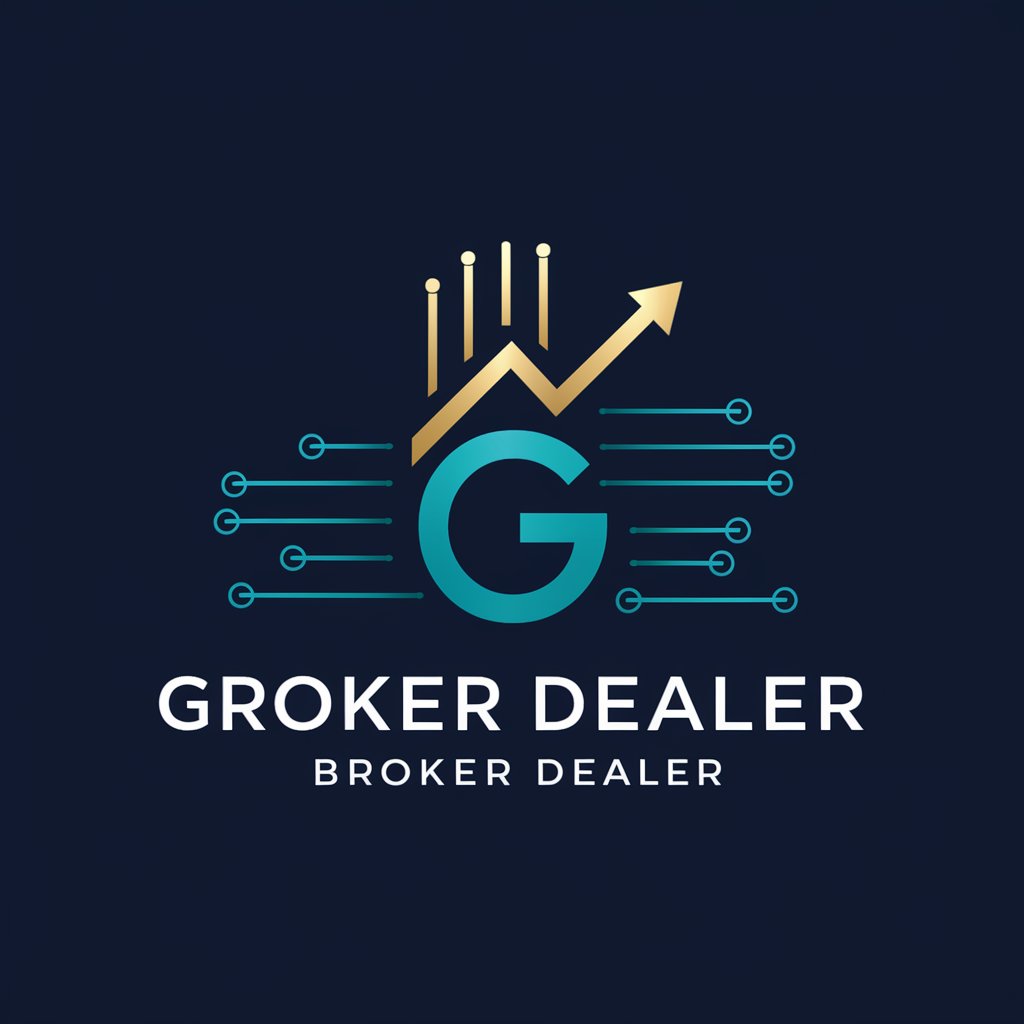
Broker Dealer - Broker Dealer Insight

Welcome! How can I assist you with your brokerage needs today?
Empowering your financial decisions with AI
Can you explain the role of a full-service broker?
What are the typical fees associated with discount brokers?
How can I choose the right broker for my investment needs?
What are the differences between online brokers and traditional brokers?
Get Embed Code
Introduction to Broker Dealer
A Broker Dealer is a person or firm in the financial services sector who buys and sells securities on behalf of their clients, as well as for their own accounts. They play a dual role by acting both as a broker, facilitating transactions for clients, and as a dealer, engaging in trading for their own inventory. This unique position enables them to provide a wide range of services, including investment advice, market making, underwriting of new issues, and facilitating transactions in stocks, bonds, and other securities. For example, when an individual wants to purchase shares, the broker dealer can execute the buy order on a stock exchange, and if they are acting as a dealer, they might sell shares directly from their own inventory to the client. Powered by ChatGPT-4o。

Main Functions of Broker Dealers
Executing Trades
Example
Facilitating the buying and selling of securities for clients.
Scenario
A client wishes to purchase 100 shares of Company X. The broker dealer executes this order on the appropriate exchange, ensuring the client receives the best possible price.
Providing Investment Advice
Example
Offering personalized investment recommendations based on a client's financial goals and risk tolerance.
Scenario
An investor looking to diversify their portfolio receives guidance on a mix of stocks, bonds, and mutual funds that align with their investment objectives.
Market Making
Example
Buying and selling securities from their own account to ensure liquidity in the financial markets.
Scenario
A broker dealer acts as a market maker in ABC stock, quoting buy and sell prices to facilitate trading and maintain market stability.
Underwriting New Issues
Example
Assisting companies in issuing new securities to the public by purchasing securities directly and reselling them to investors.
Scenario
A firm looking to go public hires a broker dealer to underwrite its initial public offering (IPO), determining the offering price and selling shares to investors.
Ideal Users of Broker Dealer Services
Individual Investors
People looking to invest in the stock market or other securities who need expert advice, access to trading platforms, and execution services. They benefit from the broker dealer's ability to provide personalized investment strategies and facilitate transactions.
Institutional Investors
Entities such as pension funds, mutual funds, and insurance companies that require large-scale investment services, including block trading and access to primary markets. Broker dealers offer the expertise and infrastructure necessary to manage complex transactions and portfolios.
Corporations
Companies seeking to raise capital through the issuance of stocks or bonds can leverage broker dealers for underwriting services, market making, and advice on the best strategies to access capital markets effectively.

How to Use Broker Dealer
Begin Free Trial
Start by visiting yeschat.ai for a hassle-free trial that requires no login or ChatGPT Plus subscription.
Identify Your Needs
Assess your financial goals and what you're looking to achieve with a broker dealer, whether it's for trading, investment advice, or managing securities.
Explore Features
Familiarize yourself with the Broker Dealer's functionalities, including market analysis, brokerage fee comparisons, and regulatory compliance advice.
Engage with the Tool
Use the tool to ask specific questions about brokers, their roles, fees, and how to select one that fits your investment strategy.
Review and Apply
Evaluate the information provided to make informed decisions about broker dealers that align with your financial objectives.
Try other advanced and practical GPTs
Summary Specialist
Distilling Complexity with AI Precision

ProductSummary Generator
Empowering insights with AI-powered summaries

Parasite
Unlocking the Secrets of Parasites with AI

Fraud
Empowering fraud prevention with AI.

Show
Explore the World of Shows with AI

Cups
Elevating Your Cup Experience with AI

Instruments
Explore, learn, and create with AI-powered musical insights.

Stock
Empowering Investment Decisions with AI

Directory
Navigate the world with AI-powered Directory

Refrigerator
Empowering your cooling choices with AI

Gutters
Streamlining Gutter Solutions with AI

Clouds
Unlock the Mysteries of the Sky

Broker Dealer FAQs
What exactly does a broker dealer do?
A broker dealer acts as an intermediary in financial transactions, buying and selling securities on behalf of clients (broker function) and for its own account (dealer function). They offer investment advice, facilitate transactions, ensure regulatory compliance, and can manage assets.
How do I choose the right broker dealer?
Selecting the right broker dealer involves considering your investment goals, the types of securities you're interested in, the level of customer service desired, and how much you're willing to pay in fees. It's also crucial to research the broker's regulatory history and client reviews.
What are typical brokerage fees?
Brokerage fees vary widely and can include commissions on trades, account maintenance fees, advisory fees, and charges for additional services. Understanding the fee structure is essential to avoid unexpected costs.
Can Broker Dealer help me understand complex financial regulations?
Yes, Broker Dealer can provide simplified explanations of financial regulations affecting your investments and advise on compliance matters, helping you navigate the complex financial landscape.
How does technology enhance the services of a broker dealer?
Technology enables broker dealers to offer more efficient and accurate services, including automated trading, real-time market analysis, personalized investment advice, and enhanced security measures to protect client assets.